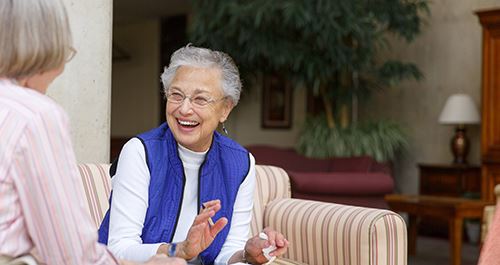We all have various roles we play in life every day: Mother. Father. Son. Daughter. Brother. Sister. Employee. Boss. The list could go on for pages, right?
 But as our parents and loved ones age, we may find ourselves at some point adding an unexpected role to that list: Family caregiver. On top of all our other duties in life, this is a role that can take a significant toll on us physically and emotionally. The stress of taking care of a loved one as their capabilities decline adds many obstacles in life, and could take precedence over other responsibilities you didn't intend on letting slide.
But as our parents and loved ones age, we may find ourselves at some point adding an unexpected role to that list: Family caregiver. On top of all our other duties in life, this is a role that can take a significant toll on us physically and emotionally. The stress of taking care of a loved one as their capabilities decline adds many obstacles in life, and could take precedence over other responsibilities you didn't intend on letting slide.
Below are not only tips for helping take care of a loved one, but also tips on taking care of yourself. This will allow you to better serve your loved one, should you ever find yourself in this role.
Educate yourself. If you're new to caregiving, it's important to learn as much about your loved one's needs and caregiving in general. Don't be afraid to reach out to other caregivers for information, tips or support. Talk with your loved one's physicians to ensure you understand any illnesses or disabilities they may currently have. Many reputable websites offer great information on caregiving, as well.
Learn to communicate effectively with doctors. As a caregiver, you'll undoubtedly find yourself in a lot of doctor's offices. The information being thrown at you can be overwhelming, so make sure you're prepared for the appointments. Write down some questions you may have ahead of time, so you're ready to present them to the doctor when appropriate. Bring your notepad and pen to the appointment, and don't be afraid to ask the doctor to explain any terms or directions more clearly if you feel confused.
Keep yourself organized. There's going to be a lot of things to keep straight, including medications and doses, appointments, scheduled routines and other regiments. Keep yourself an accurate calendar that you can easily refer to, and use technology to help remind you of important daily tasks. Smart phones and smart watches offer very convenient ways to set yourself alarms and notices throughout the day. It's a good idea to set a daily schedule for yourself and your patient to get into a routine, while allowing some room for variation and change when needed. Setting a schedule also helps you to set your limits for caregiving and communicate them clearly to your loved one so there's no confusion.
Accept your emotions. You're undoubtedly going to experience a range of emotions as a caregiver, including anxiety and worry, anger or resentment, guilt, and eventually grief. In their own way, these are all very appropriate and valid emotions to be feeling during this time. Recognize and accept these emotions as such, and don't be afraid to talk with either a friend or family member about these emotions. Even better, reach out to a professional if you feel these emotions are becoming too much for you.
 Seek respite and attend to your own needs. Just because you're a family caregiver, doesn't mean it should be a 24-7 job. You need to find time for yourself to get away and bring yourself back to neutral. Don't stop doing the things you love to do, as this can be a slippery slope that can lead to unnecessary resentment and anger toward your loved one. Don't be afraid to ask friends or family members for help to give you some time to yourself or a chance to focus on your many other roles in life. Often caregivers are afraid to ask for help because they feel they are imposing, but many times friends and family members want to help and just don't know how. Make it easier for them by taking the time to sit and describe your caregiving plan and where you could use some help.
Seek respite and attend to your own needs. Just because you're a family caregiver, doesn't mean it should be a 24-7 job. You need to find time for yourself to get away and bring yourself back to neutral. Don't stop doing the things you love to do, as this can be a slippery slope that can lead to unnecessary resentment and anger toward your loved one. Don't be afraid to ask friends or family members for help to give you some time to yourself or a chance to focus on your many other roles in life. Often caregivers are afraid to ask for help because they feel they are imposing, but many times friends and family members want to help and just don't know how. Make it easier for them by taking the time to sit and describe your caregiving plan and where you could use some help.
Take advantage of professional services. One of the most important aspects of being a caregiver is knowing your limits. As we've mentioned above, dedicating yourself to being a family caregiver doesn't mean you need to (or should) do that job every minute of the day. There's no shame in seeking professional services or guidance. There are many services available to help aid you in caregiving, including adult day cares, personal care services, health services and meal programs, among other options. Acts Retirement-Life Communities, for example, offers an Acts Home Health service in which in-home caregivers help seniors and their caregivers maintain their independence in familiar surroundings for as long as possible. It's important to explore what's available within your community, and reach out to learn more about their offerings to find what works for you and your loved one.
If you've chosen to be a caregiver, you've done so out of love and loyalty to that person. Never forget you've made a very admirable decision. Also never forget you're not alone in your endeavor. You have many options at your disposal to ensure you're taking care of yourself as much as your loved one, leading to better overall care and wellness for everyone involved.






